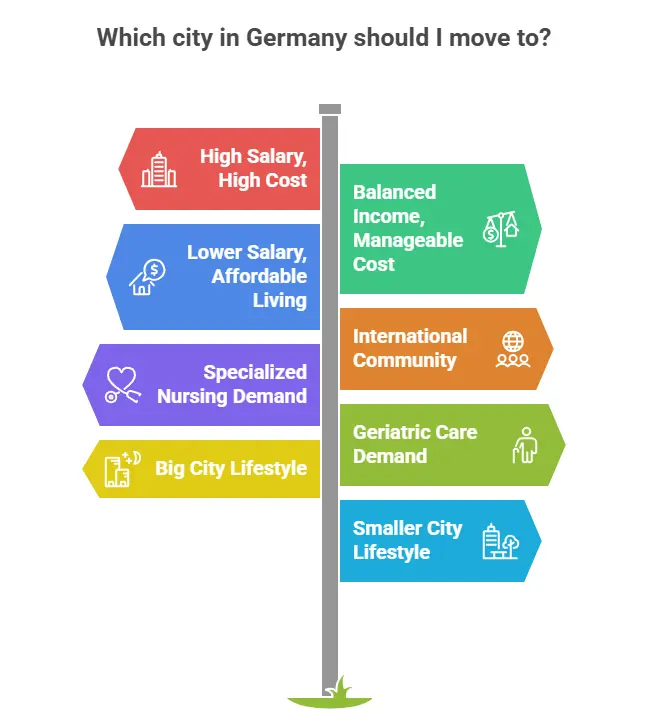Table of Contents
Introduction
Germany faces a shortage of nurses, and hospitals across the country are hiring thousands of professionals from abroad. For international nurses, this means that the unique opportunities in their careers, stable jobs and the chance to build a secure future in one of Europe’s strongest healthcare systems.
But not all cities in Germany are the same. Some places offer high wages, a better working environment and simple opportunities to integrate into daily life. Choosing the right place can be a big difference – not only in your salary, but also in the general quality of life and career development. This is why knowing the best cities for nursing jobs in 2025 is the first step moving towards Germany.
Ready to take your German skills to the next level? Get Free Demo Classes Here!
Why City Choice Matters for Nurses in Germany?
When planning to work as a nurse in Germany, many focus only on getting jobs and recognition. But an important factor is often ignored – the city you choose to live and work in. Your location can not only affect your salary, but also your lifestyle, career opportunities and general happiness.
1. Salary Differences Across States:
Germany is divided into federal states, and the wages between them may be different. Generally, nurses in Western states and capital regions such as Munich, Frankfurt or Stuttgart serve more than in eastern regions. This difference exists due to strong economies and high demand in some areas. Choosing the right city can mean several hundreds of euros in the monthly salary.
2. Cost of Living:
At the same time, wages are not everything – you also have to see the cost of living. Cities such as Munich and Hamburg provide high salaries, but also pay a lot of rent. Otherwise, people from small towns or Eastern Germany can offer low wages but very cheap homes and daily expenses. Balancing wages with living costs is important to save money.
3. Language Environment and Communities:
For international nurses, the language environment makes a big difference. In big cities such as Berlin, Frankfurt or Hamburg, you will find a lot of international communities. This can make integration easier. Small cities may have fewer international groups, but they provide a better chance to practice German daily.
4. Hospital and Clinic Availability:
Some cities have global-elegance hospitals and medical universities, providing numerous possibilities for career development and expertise. Others focus more on aged care homes, which might also suit nurses who are inquisitive about iconic care. Where you work shapes your profession path.
Best Cities for Nursing Jobs in Germany:
1: How do you say "Good Morning" in German?
Germany provides excellent career opportunities for nurses, offering competitive salaries, modern healthcare facilities, and a high quality of life. Nurses can choose cities based on salary, work-life balance, cultural experiences, and professional growth opportunities. Here’s a closer look at some of the best cities for nursing jobs in Germany:
Berlin
Berlin, Germany’s capital, has a high demand for nurses, especially in public hospitals, clinics, and elderly care homes. Salaries may be slightly lower than in cities like Munich or Frankfurt, but Berlin compensates with a strong international community. Many residents speak English, which makes integration easier for foreign nurses still improving their German. The cost of living varies by neighborhood, with options ranging from moderate to high, depending on lifestyle preferences.
The city is also known for its vibrant culture, history, and nightlife, which makes it attractive for young professionals. Berlin offers numerous opportunities for continuing education, professional workshops, and career advancement in specialized areas such as ICU, geriatrics, and pediatric care. Nurses can enjoy a fulfilling social life while growing in their careers in a city that blends professional opportunities with cultural richness.
Munich
Munich offers some of the highest salaries for nurses in Germany, especially for those specializing in ICU, surgery, or geriatric care. Hospitals are well-equipped and continuously seek skilled professionals. However, the cost of living in Munich is higher compared to other cities, especially for rent, transportation, and daily expenses. Despite the higher expenses, the strong salaries often compensate, making it feasible for nurses to save money while enjoying a high standard of living.
Munich is not only a professional hub but also offers an excellent quality of life. The city is full of green spaces, museums, cultural festivals, and access to the Alps for recreational activities. Efficient public transport, safe neighborhoods, and a thriving professional environment make Munich ideal for ambitious nurses seeking career growth while enjoying urban convenience and leisure opportunities.
Hamburg
Hamburg, Germany’s major port city, has a robust healthcare system with both public and private hospitals offering ample nursing opportunities. Salaries are above average, and demand is increasing, particularly in rehabilitation and long-term care. The city provides a balanced lifestyle, combining modern healthcare facilities with comfortable living.
Apart from professional benefits, Hamburg offers cultural richness and recreational options. Nurses can enjoy life along the Elbe River, attend cultural programs, and access quality education and sports facilities. The city’s strong infrastructure, safety, and diverse community make it appealing for both single professionals and families, while professional associations help nurses continue their career growth through workshops and training programs.
Frankfurt am Main
Frankfurt, Germany’s financial hub, attracts international nurses with high-paying private hospitals and clinics. The city offers a cosmopolitan environment where English is sometimes used alongside German in professional settings, making it easier for foreign nurses to integrate. Although the cost of living is high, higher salaries often offset expenses.
Frankfurt also provides excellent professional networking opportunities, a fast-paced urban lifestyle, and diverse cultural experiences. Nurses can work in innovative hospitals, medical research centers, and healthcare startups, gaining exposure to advanced healthcare systems. The city’s efficient transport and international connections make it convenient for both professional and personal life.
Cologne (Köln)
Cologne is a welcoming city with a strong healthcare system, particularly in elderly care and general hospitals. Compared to Munich or Frankfurt, living expenses are lower, while salaries remain competitive. Nurses can enjoy both job security and affordable living without compromising their lifestyle.
Cologne is culturally rich, hosting famous festivals, historic landmarks, and a vibrant social scene. The city provides opportunities for professional growth through workshops, networking, and mentorship programs. Foreign nurses can benefit from language courses and integration support, making Cologne an ideal choice for a balanced professional and personal life.
Stuttgart
Stuttgart is situated in one of Germany’s strongest economic regions and has a high demand for nurses in large hospitals and advanced health services. Salaries are good, though the cost of living varies by neighborhood. Stuttgart is particularly family-friendly, making it an attractive choice for nurses planning long-term settlement.
The city combines economic stability with career opportunities, offering access to advanced medical facilities and professional training programs. Nurses can enhance their skills in specialized fields and enjoy a quality lifestyle with safe neighborhoods, good schools, and recreational options. Stuttgart’s mix of professional growth and family-oriented living makes it a reliable choice for long-term careers.
Düsseldorf
Düsseldorf is a medium-sized modern city offering a balance between professional opportunities and comfortable living. Specialized nursing roles in geriatrics, rehabilitation, and advanced care are increasingly in demand. The city is less crowded than Berlin or Munich but provides excellent infrastructure and healthcare facilities.
Düsseldorf also has a strong cultural scene, with museums, theaters, and recreational activities. The city’s expat-friendly environment, supportive community, and professional networks make it easier for foreign nurses to integrate. With numerous hospitals, clinics, and private health centers, Düsseldorf provides diverse career paths and opportunities for specialization.
|
German A2 Exercises – Download Free PDF |
||
Other Rising Cities: Leipzig, Hannover, Essen.
Small cities like Leipzig, Hannover and Essen are becoming more attractive to nurses. Although the salary here may be slightly lower than Munich or Frankfurt, their cost of living expenses are very cheap, and it would be helpful to those who save money. There is also a growing demand for nurses in these cities, especially in elderly care and regional hospitals. For those who prefer cheap lifestyle cities, these places are better option.
Start learning German today to fast-track your career in Germany!
Free German A1 Mock Tests – Powered by AI!
Test your skills on our interactive platform. Get instant feedback from our AI to help you communicate better and track your progress. Start your free German mock test now.
Test Your German A1 for FreeSalaries & Cost of Living (by City)
| City | Average Nurse Salary (€ per month) | Cost of Living | Demand Level | Description |
|---|---|---|---|---|
| Berlin | €2,800–3,200 | Medium | High | Berlin provides stable wages and high demand for nurses. The cost of living varies from the neighborhood, but the city’s international mood makes it attractive to foreign nurses. |
| Munich | €3,000–3,500 | Very High | High | Munich pays a certain highest salary in Germany, but living costs – especially on rent – are the most expensive. The demand for skilled nurses is very strong. |
| Hamburg | €2,900–3,300 | Medium –High | High | Hamburg combines up-to-high wages with high demand, especially in long-term care. The cost of living is slightly higher than the quality of life and the balance between work and life, but balanced. |
| Frankfurt | €3,100–3,600 | High | Medium–High | Frankfurt provides excellent salary, although the costs are also high. Together with the international community, nurses have strong job prospects, especially in private hospitals. |
| Cologne | €2,800–3,200 | Medium | High | Cologne provides appropriate wages with less expensive lifestyle than big cities. The demand for nurses is strong, especially among the elderly. |
| Stuttgart | €3,000–3,400 | High | High | Stuttgart offers a good pay and great career opportunities. While living costs are high, the city is family-friendly and ideal for long-term stability. |
Factors to Consider when Choosing a City
1. Salary vs. Cost of Living:
If you would like to move to Germany as a nurse, wages are often the first thing that people look for. While some cities such as Munich or Frankfurt provide excellent pay, but their living costs are too high – especially in the case of rent, transport and food. This means that although you earn more, you may not be able to save much. Otherwise, cities such as Cologne or Berlin may pay less compared to other cities, but living costs are more manageable, making it easier to balance income and all other expenses.
Small cities like Leipzig or Hannover often have low wages, but living costs can be maintained, so it can be easy to save money as much. The important thing is that you should look at both salaries and expenses at the same time, not just paycheck only.
2. Language Opportunities:
German is one of the main language used in most hospitals, but in some international cities such as Berlin and Frankfurt, many people also speak English. This makes it easier for foreign nurses who still learn German to settle and communicate in their daily life. However, in small cities, there may not have many English speakers, which means you will need strong German skills to feel comfortable. If you are new to the country and are still improving your German language, then should start in an international cities can make your communication very smooth.
3. Type of Nursing Demand:
Different cities in Germany have separate health services. For example,
- Munich and Stuttgart have strong demand in special areas such as ICU, surgery and pediatrics thanks to their advanced hospitals.
- Hamburg and Cologne observe rapid growth in geriatrics and elderly care, as these cities have an aging population and many retired houses.
- Small cities often require nurses in general care and regional hospitals, where less special professionals are available.
When you know which field you want to work in, it can help you choose a city that matches your career goals.
4. Lifestyle: Big City vs. Smaller City:
Lifestyle as just important as salary. Big towns like Berlin, Munich, and Frankfurt are best if you experience a hectic, modern life with lots of cultural occasions, nightlife, and an international network. However, they can also be crowded, stressful, and luxurious.
Smaller cities like Leipzig, Hannover, or Essen are calm, less expensive, and often more family-friendly. They will not have as many international communities, however, they provide a relaxed way of life and extra chances to save money. If you value peace, affordability, and balancing life, smaller towns may suit you better. If you select pleasure and networking possibilities, large cities are the best place to move.
|
Goethe 2025 Exam Dates: Multiple Test Centers |
|
| Trivandrum Goethe Exam Dates | Kochi Goethe Exam Dates |
| Chennai Goethe Exam Dates | Coimbatore Goethe Exam Dates |
Conclusion
Start learning German today to fast-track your career in Germany!
Germany has great nursing opportunities across the country, but some cities like Munich, Frankfurt, Hamburg and Berlin stand out with strong demands, appropriate salaries and modern health facilities. Meanwhile, small towns like Cologne, Stuttgart or Leipzig also provide good opportunities for freshers, often with lower living costs and a more comfortable lifestyle.
When choosing places to work, it is very important to look beyond just the salary. Mainly, think about the living cost in that city, the type of nursing jobs and the kind of lifestyle that you want. A city that fits the goals of your career and your personal life will give you the best long-term happiness.
Free German A1 Mock Tests – Powered by AI!
Test your skills on our interactive platform. Get instant feedback from our AI to help you communicate better and track your progress. Start your free German mock test now.
Test Your German A1 for FreeFrequently Asked Questions
Which German city pays nurses the highest?
Munich and Frankfurt usually pay the highest salaries to nurses in Germany, often between €3,000–3,600 per month. These cities also have advanced hospitals and plenty of opportunities in specialized areas like ICU, surgery, and pediatrics. But keep in mind, both Munich and Frankfurt have a very high cost of living. Rent, transport, and food can be expensive, so while the salary is great, saving money can be more challenging compared to smaller cities.
Is Berlin good for international nurses?
Yes, Berlin is one of the most welcoming cities for international nurses. As the capital, it has a large international community, and many people, especially in hospitals and public places, can speak English. This makes daily life easier while you continue improving your German. Berlin also has a high demand for nurses, especially in public hospitals and elderly care, so job opportunities are plenty. On top of that, Berlin’s cultural life, diversity, and relatively affordable cost of living (compared to Munich or Frankfurt) make it a great choice for foreign nurses starting out in Germany.
Are small cities better for saving money as a nurse?
Yes, smaller cities can be a smart choice if your goal is to save money. Places like Leipzig, Hannover, or Essen may offer slightly lower salaries than big hubs, but the cost of living is much cheaper—especially rent and daily expenses. This balance often means nurses in smaller cities can save more at the end of the month compared to someone living in Munich or Frankfurt. Smaller cities also provide a calmer, more relaxed lifestyle, which many nurses find appealing after long shifts.
Do all cities require B2 German for nursing jobs?
Yes, to work as a registered nurse in Germany, you need at least B2 level German. This is required by hospitals, clinics, and also for official recognition of your nursing qualification. In big cities like Berlin or Frankfurt, knowing English can help you manage daily life, but German is still necessary for communicating with patients, colleagues, and handling medical tasks. If your German isn’t at B2 yet, many cities offer language courses, and some hospitals even support nurses in improving their language skills.













